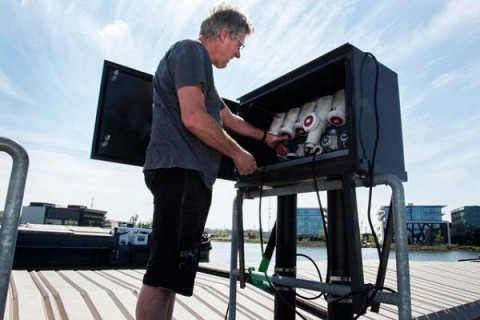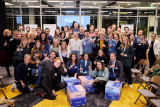AEB Amsterdam, Port of Amsterdam, Senfal and Energy eXchange Enablers will jointly supply ship-to-shore power to river cruise and inland navigation vessels. The pilot project is intended to promote the use of sustainable, locally generated power in the port and to reduce costs.
The participation of AEB Amsterdam is an important step for the ship-to-shore power project, as it means that a producer of sustainable energy is directly involved in the pilot project. This mirrors the port’s ambitions: to supply locally generated sustainable electricity to customers in the port.
Information from Port of Amsterdam on the use of berths and arrival times for vessels based on self-learning software, developed by the company Senfal, is linked to a digital market place for electricity. Entrnce, as this trading platform from Energy eXchange Enablers (EXE) is called, provides a direct link between the producer of electricity and the customer.
Shore power stations make it possible for river cruise and inland navigation vessels to switch off their diesel generators at the quay. They will use the sustainable power grid, meaning no emissions are released at the site concerned. The pilot project will increase the use of sustainable power in the port, allow costs to be reduced, and also provide improved matching of fluctuations in sustainable energy supply and demand.
AEB Amsterdam is the largest supplier of sustainable energy in the Amsterdam region. “We are able to optimise supply because we produce both electricity and heat,” says the strategic adviser Peter Simoës. “Whenever there is a peak in demand for sustainable electricity, we can increase production slightly by temporarily supplying less heat to our buffer, and vice versa. This cushion makes better matching of supply and demand possible and offers scope for supplying more solar or wind energy to the port, for instance.”
Robin Schipper, commercial manager Circular & Renewable Industry at Port of Amsterdam: “This pilot project provides us with very significant insights for preparing our port for the energy market of the future. In the future, you want to be able to source local sustainable energy even if there is no wind or the sun is not shining. A range of smart applications is used in this pilot project that will reduce costs for the businesses in the port area. We are aiming for green for the price of grey!”
Ambitions
The transition to more sustainable and local sources requires new market models. This pilot project, launched on the basis of the Clean Capital alliance and partly funded by the European demonstration project City-zen, is a good example of this kind of market model; locally generated energy is used locally without the interposition of a traditional electricity supplier. In tandem with innovative parties such as Senfal and EXE, it is possible to make the transition to the smart and sustainable energy network of the future.
Port of Amsterdam wants to link a wind farm and solar panels directly to users as well in the near term. The EXE trading platform also offers small producers an opportunity to enter the market and optimise trading between them. The software from Senfal is able to match electricity supply and demand, creating a single system. This steps up the innovation and sustainability of the pilot project even further to provide a genuine example of a local sustainable energy network.






It's a great start born out of the European FP7 project City-Zen meetings with stakeholders: EXE (Liander), PoA, UVA, TU Delft, DNVGL, Amsterdamsmartcity, Waternet and AEB, about 4 years ago. It's a blueprint for future energy markets: Open, transparant and P2P sustainable energy.